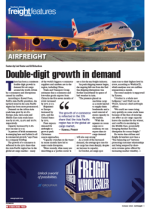Sean Petzer, founder of ESBD (ES Business Development), says South African exporters and importers are switching to more environmentally sustainable packaging systems, or at the very least, looking for ways to reduce their impact on the environment.Shippers and airlines are under pressure to reduce the environmental impact of single-use plastic packaging generated by freight operations.A new report by the International Air Transport Association (Iata) emphasises the industry's need to reduce the use of plastic sheeting and stretch wrap, commonly found in cargo operations.The report calls for a shift towards circular economies in materials usage, product design and waste management, which will align the operations of the air cargo industry with broader environmental goals.Pressure to reduce waste and carbon emissions is coming from both governments and consumers. One way is more efficient space utilisation through the double stacking of containers, making use of a special sleeve that allows transporters to place a second pallet in excess of 750 kg on top of the first.“This system protects against pilferage and also eliminates dead space in aircraft holds through the addition of a second stack,” he told Freight News. “The impact extends throughout the logistics chain. “A 45% improvement in payload on both the landside and airside equates to a 45% saving on the carbon footprint of the fuel used and better utilisation of the vehicles used to transport the cargo to and from the terminal and the aircraft,” said Petzer. The sleeve comes in reusable plastic with a lifespan of up to three years or in cardboard that can be recycled through common curbside paper recycling programmes. And both formats hold 750+kg. A second breakthrough is the development of fully reusable thermal packaging which maintains temperature for up to six days without the need for dry ice, gel packs, electric power or any human intervention throughout the use of the packaging.“You can now ship high-value temperature-controlled cargo in a guaranteed door-to-door cold chain for the same price as standard cargo,” he said.The packaging is rated for a range of goods, including chemicals, foods, fresh fruit, pharmaceuticals and vaccines. “Because the packaging is fully sealed, you can stack items which would not normally be compatible in the same space. They are also independent of the ambient temperature, which means you can have cargo at five degrees Celsius and minus 20 in the same truck or hold.“Effectively, you get double the volume of cargo because you do not need to allow for additional cooling mechanisms,” he adds.Bluetooth Iata-compliant dataloggers record temperature and whether the container has been opened during shipment.ESBD is investigating the possibility of assembling the containers in South Africa to stimulate job development while meeting the growing demand for the packaging.The company offers a point-to-point lease option for the reusable sleeves and thermal packaging. A third technology from ESBD that helps companies reduce their carbon footprint is paper pallet jackets. They are validated at a pharmaceutical grade and used in all industries, including high-value, but they can be recycled just like any other paper product and are much easier and more cost-effective to recycle than plastics and foil. ER

